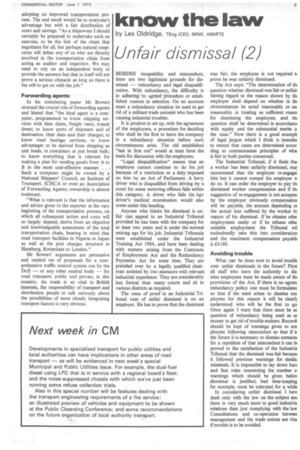know the law
Page 59

If you've noticed an error in this article please click here to report it so we can fix it.
by Les Oldridge, TEng (CEO, MIMI, AMIRTE
Unfair dismissal (2)
BESIDES incapability and misconduct, there are two legitimate grounds for dismissal — redundancy and legal disqualification. With redundancy, the difficulty is in adhering to agreed procedure or established custom in selection. On no account must a redundancy situation be used to get rid of a militant trade unionist who has been causing industrial troubles.
It is prudent to set up, with the agreement of the employees, a procedure for deciding who shall be the first to leave the company in a redundancy situation before such circumstances arise. The old established "last in first out" would at least form the basis for discussion with the employees.
"Legal disqualification" means that an employee cannot continue to do his job because of a restriction or a duty imposed on him by an Act of Parliament. A lorry driver who is disqualified from driving by a court for some motoring offence falls within this category. A driver who fails his hgv driver's medical examination would also come under this heading.
Anyone who thinks his dismissal is unfair can appeal to an Industrial Tribunal provided he has been with the company for at least two years and is under the normal retiring age for his job. Industrial Tribunals were established under the Industrial Training Act 1964, and have been dealing with matters arising from the Contracts of Employment Act and the Redundancy Payments Act for some time. They are presided over by a legally qualified chairman assisted by two assessors with relevant industrial experience. They are considerably less formal than many courts and sit in various districts as required.
The onus of proof in an Industrial Tribunal case of unfair dismissal is on an employer. He has to prove that the dismissal was fair, the employee is not required u prove he was unfairly dismissed.
The Act says: "The determination of till question whether dismissal was fair or unfair having regard to the reason shown by the employer shall depend on whether in the circumstances he acted reasonably or un reasonably in treating as sufficient reasoi for dismissing the employee; and thi question shall be determined in accordance with equity and the substantial merits o the case." Now there is a good example of legal jargon which I think is intendec to ensure that cases are determined accor ding to commonsense principles of wha is fair to both parties concerned.
The Industrial Tribunal, if it finds tha a worker has been unfairly dismissed, ma3, recommend that the employer re-engage: him but it cannot compel the employer tc do so. It can order the employer to pay thi dismissed worker compensation and if the suggestion of re-engagement is not accepte( by the employer obviously compensatiot will be payable, the amount depending ot the actual loss suffered by the worker bl reason of his dismissal. If he obtains othe employment easily or if he refuses othe suitable employment the Tribunal wil undoubtedly take this into consideration and the maximum compensation payabh is £4160.
Avoiding trouble What can be done now to avoid troubb over unfair dismissals in the future? First all staff who have the authOrity to dis miss employees must be made aware of tilt provisions of the Act. If there is no agree( redundancy policy one must be formulate( so that if the need arises to dismiss em ployees for this reason it will be clear13 understood who will be the first to go Once again I warn that there must be n( question of redundancy being used as as excuse to get rid of trouble-makers. Record: should be kept of warnings given to em ployees following misconduct so that if ir the future it is necessary to dismiss someon4 for a repetition of that misconduct it can b4 proved to the satisfaction of the Industria Tribunal that the dismissal was fair becauso it followed previous warnings for simila: misdeeds. It is impossible to lay down han and fast rules concerning the number o warnings which should be given befort dismissal is justified; bad time-keeping for example, must be tolerated for a while In considering unfair dismissal I hav( dealt only with the law on the subject an there is very much more to good industria relations than just complying with the law Consultations and co-operation betweer management and the trade unions are vita if trouble is to be avoided.




































































































